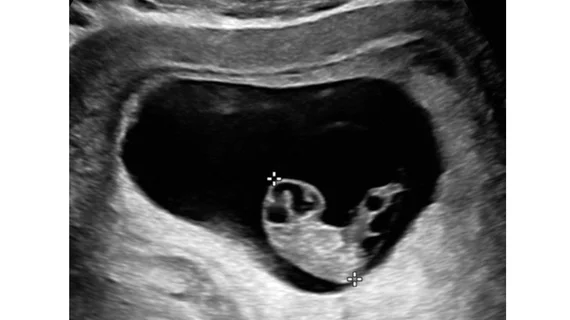1 day of training with AI makes novice sonographers as accurate as experts in gestational measurements
An ultrasound probe integrated with artificial intelligence enables novice clinicians to measure gestational age with accuracy comparable to expert sonographers.
This sort of tool could be a game changer for prenatal care in low resource settings, authors of a new paper published in JAMA suggest.
“The World Health Organization recommends that all pregnant people receive at least one ultrasonography examination prior to 24 weeks. Although this policy recommendation remains largely aspirational in many low- and middle-income countries, recent advances in ultrasonography hardware and artificial intelligence–enabled medical image analysis could facilitate broader access to this critical diagnostic tool," Jeffrey S. A. Stringer, MD, with the UNC School of Medicine in North Carolina, and colleagues write.
The deep learning model is integrated directly into ultrasonography device software that runs on an Android tablet computer. It enables image processing and feature extraction to occur in real time on the local device, allowing providers to immediately make clinical determinations.
Researchers recently tested the AI device on a group of 400 women in Chapel Hill, North Carolina and Lusaka, Zambia who were in their first trimester of pregnancy. To determine whether the tool could provide accurate gestational age (GA) measurements when in the hands of individuals less experienced with conducting prenatal ultrasound exams, researchers had expert sonographers establish ground truth GA for all study participants via transvaginal ultrasound. During follow-up visits throughout gestation (between 14 and 27 weeks), novice users measured GA themselves (after just a single day of training) by conducting blind sweeps of the patients’ abdomen using the AI-enabled device.
Accuracy was measured based on the mean absolute error (MAE) of users’ estimation of GA, which was considered equivalent if it fell within ±2 days of the ground truth.
With the AI device, novice users yielded a MAE of 3.2 (0.1) days vs 3 (0.1) days for the sonographers. Just over 90% of the AI assessments fell within seven days of the ground truth—just shy of the 92.5% achieved by sonographers. AI's performance was consistent for patients in both locations and among patients with a higher body mass index.
Given the tool’s accuracy and ease of use, it could provide much needed access to accurate GA measurements in areas with fewer healthcare resources, the group suggests.
“The deep learning model was incorporated directly into the ultrasonography device software, which runs on an Android tablet computer, allowing image processing, feature extraction, and inference to occur in real time on the local device, facilitating immediate clinical decision-making,” the authors explain, later adding that their findings “have immediate implications for obstetrical care in low-resource settings.”
Similar AI systems could be utilized in low-resource settings to further advance the World Health Organization’s goal of providing accurate GA measurements for all pregnant people, the experts said.
The study abstract is available here.

